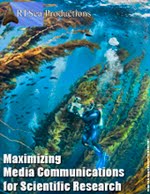Previous studies of several species of rays, part of the same general family as sharks, were found to have several types of ospins or light sensitive proteins in the photoreceptors of their retinas which provide them with the ability to see in color. But studies of wobbegong sharks showed them to not have the necessary levels of ospins for color, only black and white.
Dr. Susan Theiss, University of Queensland (yes, we're related - she is my niece), and her colleagues studied two different species of wobbegong sharks; each of which prefer different levels of depth in the sea as their normal habitat. Because of those differences in depth, the vision of the two species is more sensitive to different wavelengths of light. Each species is better attuned to the type of light that predominantly penetrates their environment. One wobbegong shark species preferred deeper water where it is penetrated by shorter wavelengths - a bluish kind of light. Sharks in shallower water can be more sensitive to red or green spectrums of light.
Color blind as they are then, sharks live in a world of contrast. Their other senses of sound and scent can aid them in their search for prey then, at some point, contrasting visual stimuli kicks in, and at close range sensing electrical impulses can come into play.
Sometimes color can be a distraction and can prevent the shark from staying focused on a potential target. Color exists in nature for a variety of reasons and in some environments it can actually act as a kind of camouflage. Oddly enough, as a filmmaker, I typically use a black and white viewfinder with my camera as it can often provide a sharper image for focusing purposes.
Playing off that sense of visual contrast, it might be possible to help keep sharks from becoming accidental bycatch by camouflaging or making hooks less visually interesting. And the same could possibly be said for surfers who provide considerable contrast (as does a seal) in their black wetsuits.
"If we can use this knowledge to design longline fishing lures that are less visible to sharks then we will be able to reduce the amount of shark bycatch. We may also be able to make wetsuits less attractive, and make the water safer for surfers and divers," says co-author Associate professor Nathan Hart of the University of Western Australia and reported in Australia's ABC Science.
Source: ABC Science


















No comments:
Post a Comment